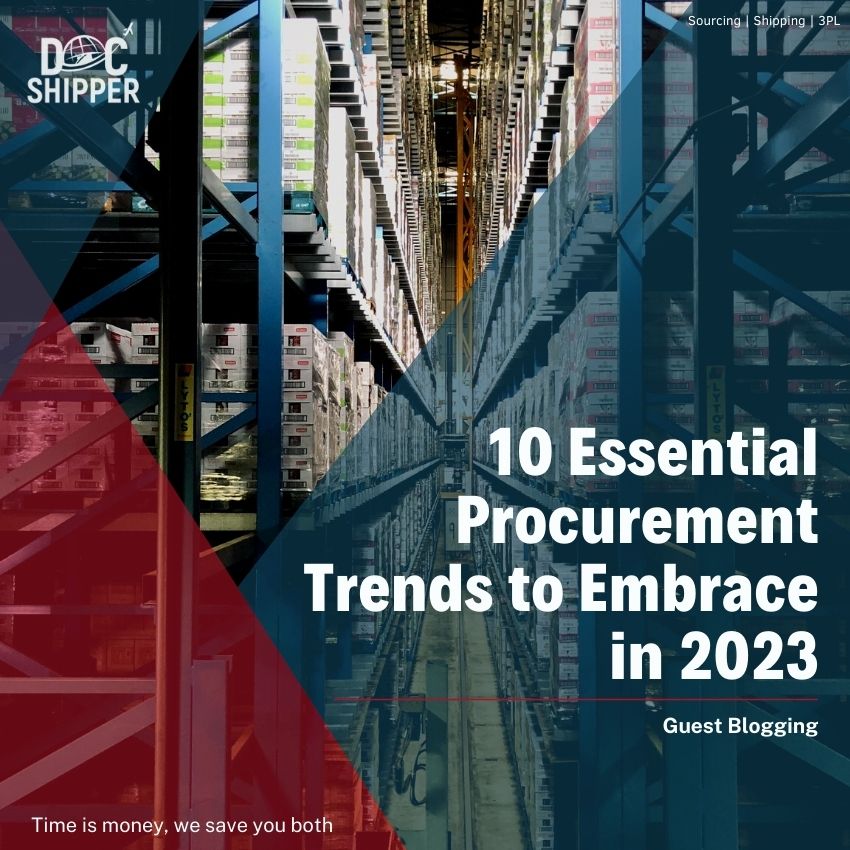Procurement refers to acquiring goods or services that a company needs to operate. This can include everything from raw materials and production inputs to office supplies and equipment.
It is typically managed by a procurement department responsible for identifying the organization’s needs, evaluating potential suppliers, negotiating prices and contracts, and managing the procurement process from start to finish. Here are a few potential procurement trends to consider embracing in 2023.
1. Increased use of artificial intelligence and machine learning
By leveraging AI and machine learning, companies may improve their forecasting, supplier selection, and contract negotiation processes.
There are several ways that companies can use artificial intelligence (AI) and machine learning to optimize procurement processes:
Forecasting: AI and machine learning algorithms can accurately analyze historical data to predict future demand for goods and services. This can help procurement departments better plan for their needs and avoid shortages or excess inventory.
Supplier selection: machine learning can be used to analyze data about suppliers, including their past performance, pricing, and delivery record, to identify the best suppliers for a given need.
DocShipper Alert
DocShipper Alert: Looking for a reliable supplier? DocShipper got you covered with its sourcing services. Send us the product you are interested in, and we will find a partner you can trust, negotiate prices, and conditions favorable to your situation and organize the shipment of samples. Contact us to find out how we can help you. Have a question? Call us now
Contract negotiation: analyze market prices and supplier performance data to inform negotiations and help procurement departments secure the best possible terms.
Spend analysis: analyze data about a company’s spending patterns to identify opportunities for cost savings and efficiency improvements.
Overall, using AI and machine learning in procurement can help companies make more informed, data-driven decisions and optimize their procurement processes.
2. Greater focus on sustainability and social responsibility
Companies may prioritize sustainability in their procurement decisions, choosing environmentally and socially responsible suppliers. This can include reducing waste, using renewable energy, and implementing fair labor practices. By focusing on sustainability and social responsibility, companies can improve their reputation and potentially reduce their costs by working with more efficient and responsible suppliers.
There are several ways that procurement departments can prioritize sustainability and social responsibility
- Incorporating sustainability and social responsibility criteria into supplier selection: Procurement departments can use data about suppliers’ environmental and social impact when evaluating potential suppliers.
- Negotiating sustainability and social responsibility clauses into contracts: they can negotiate contract clauses requiring suppliers to meet certain sustainability and social responsibility standards.
- Partnering with suppliers to improve sustainability and social responsibility: they can work with suppliers to help them improve their sustainability and social responsibility practices, for example, by providing guidance or training.
- Promoting transparency and traceability in the supply chain: they can use tools such as blockchain technology to improve supply chain transparency and traceability, helping to ensure that suppliers are meeting the company’s standards and requirements.
DocShipper info
DocShipper info : You might be interested in this article: Strategic Sourcing: The finest approach to procurement management
3. Greater use of procurement technologies
Procurement technologies such as e-sourcing and e-procurement platforms can streamline the procurement process and improve efficiency. There will likely be greater use of procurement technologies in 2023. Some examples of procurement technologies include:
- E-sourcing platforms: These online platforms allow companies to automate the process of sourcing goods and services from suppliers. E-sourcing platforms can help companies identify potential suppliers, request quotes, and compare prices and terms.
- E-procurement platforms: These online platforms enable companies to automate purchasing goods and services from suppliers. E-procurement platforms can help companies place orders, track deliveries, and manage invoices and payments.
- Spend analysis tools: These tools analyze data about a company’s spending patterns to identify opportunities for cost savings and efficiency improvements.
- Supplier relationship management (SRM) systems: SRM’s help companies manage their relationships with suppliers, including tracking performance, negotiating contracts, and resolving issues.
4. Continued globalization of procurement
As the global economy continues to evolve, companies may increasingly look to international suppliers to meet their needs. Companies may increasingly look to international suppliers to meet their needs. Several factors can drive the globalization of procurement, including:
- Cost savings: Companies can find lower prices for goods and services from international suppliers, particularly in countries with lower labor and production costs.
- Access to specialized expertise: Companies can find international suppliers that have specialized expertise or capabilities that are not available locally.
- Diversification of risk: Working with international suppliers can help companies diversify their supply chain and reduce the risk of disruptions from local events.
- Global expansion: By globalizing their procurement, companies can access a wider range of suppliers and potentially benefit from cost savings and access to specialized expertise. However, it is important for companies to carefully evaluate the risks and challenges of working with international suppliers, such as potential cultural differences and differences in legal and regulatory environments.
DocShipper Alert
Note: Over the years, DocShipper has developed a large database of verified suppliers and manufacturers in Asia. We will also take care of the entire procurement process so you don’t have to. Contact us to find out how we can help you. Have a question? Call us now
5. Increased collaboration between procurement and other departments
There will likely be an increased focus on collaboration between procurement and other departments in 2023. Procurement departments may work more closely with other departments, such as marketing, engineering, and finance, to understand their specific needs and find the best suppliers to meet those needs. This can help procurement departments make more informed, strategic decisions and ensure that the company gets the right goods and services to support its operations.
Involve other departments in the supplier selection process: Procurement departments can work with other departments to identify their needs and preferences when evaluating potential suppliers.
Establish regular communication channels: they can establish regular communication channels with other departments to stay informed about their needs and priorities.
Collaborate on negotiations: they can work with other departments to negotiate contracts and terms that meet the needs of both the company and the supplier.
Share information about supplier performance: they can share information about the performance of different suppliers with other departments, helping them to make more informed decisions about which suppliers to work with.
6. Emphasis on data-driven decision-making
Procurement departments may use data analysis to inform their decisions about which suppliers to work with to make more informed, strategic choices.
Data-driven decision-making has become an essential trend in procurement, as it allows procurement professionals to make informed decisions based on data and analysis rather than subjective opinions or assumptions.
Procurement professionals can use data to identify the most cost-effective suppliers, negotiate better deals, and optimize the procurement process. For example, procurement professionals can use data to track and analyze spending, identify cost savings opportunities, and monitor supplier performance.
By using data to drive their decisions, procurement professionals can improve the efficiency and effectiveness of the procurement process and make better decisions that benefit their organizations.
7. Greater use of digital platforms for collaboration
The use of digital platforms for collaboration will likely continue to be a trend in procurement. Digital platforms can facilitate collaboration between procurement professionals and other stakeholders, such as suppliers, by providing a central location for communication and information sharing. They can also make it easier for procurement professionals to access and analyze data, which can help them make more informed decisions.
There are several benefits to using digital platforms for collaboration in procurement. For example, they can help reduce the time and cost of communication and coordination, as procurement professionals can access and share information electronically rather than relying on in-person meetings or phone calls.
Digital platforms can also help improve information accuracy and consistency, as they provide a central repository for data and documentation. Additionally, digital platforms can make it easier for procurement professionals to work with stakeholders in different regions or time zones, as they can collaborate remotely in real time.
DocShipper info
DocShipper info : By working with DocShipper you won’t have to make a single phone call or send an email to any stakeholder involved in the procurement process. Your only contact is your DocShipper consultant who will be assisting you until your goods are delivered! Contact us to know more about our transparent pricing plan.
8. Increased adoption of shared services and outsourcing
The adoption of shared services and outsourcing will continue to be trends in procurement. Shared services refer to the consolidation of common business functions, such as procurement, HR, and IT, into a centralized unit that serves multiple business units or organizations. Outsourcing refers to the practice of hiring an external company to perform a business function that is normally carried out in-house.
There are several potential benefits to adopting shared services and outsourcing in procurement. For example, shared services can help to reduce costs by eliminating duplication of effort and leveraging economies of scale.
Outsourcing can also reduce costs by allowing organizations to take advantage of lower labor and overhead costs in other countries. In addition, shared services and outsourcing can help organizations access specialized expertise and improve efficiency by allowing them to focus on their core competencies.
However, it is important for organizations to carefully consider the potential risks and costs associated with shared services and outsourcing before implementing these strategies. For example, costs may be associated with transitioning to a shared services model or managing external vendors. Additionally, there may be risks associated with losing control over critical business functions or with the potential for vendor performance issues.
9. Emphasis on building long-term, strategic relationships with suppliers
Building long-term relationships with suppliers can help procurement professionals to negotiate better deals, improve the quality of products and services, and reduce the risk of supply chain disruptions.
There are several strategies that procurement professionals can use to build long-term, strategic relationships with suppliers. For example, they can establish clear communication channels and regularly engage with suppliers to understand their needs and concerns.
Procurement professionals can also work with suppliers to identify opportunities for collaboration and innovation, such as the co-development of new products or processes. Additionally, procurement professionals can use data and analytics to track supplier performance and identify areas for improvement.
By building long-term, strategic relationships with suppliers, procurement professionals can create a more stable and reliable supply chain, which can help improve their organizations’ efficiency and effectiveness.
10. Use of blockchain technology to enhance supply chain transparency and traceability
The use of blockchain technology to enhance supply chain transparency and traceability is a potential trend in procurement. Blockchain is a decentralized digital ledger that allows transactions to be recorded and verified securely and transparently. In procurement and supply chain management, blockchain can track the movement of goods and materials from the point of origin to the end customer.
There are several potential benefits to using blockchain in procurement and supply chain management. For example, blockchain can improve transparency by providing a clear and accurate record of transactions and movements. This can help to reduce the risk of fraud or errors and improve trust between supply chain partners.
Blockchain can enhance traceability by providing a complete and verifiable record of the movement of goods and materials. This can be particularly useful in industries such as food and pharmaceuticals, where traceability is critical for quality and safety.
However, it is important to note that implementing blockchain technology can be complex and requires a significant investment in infrastructure and resources. Regulatory and compliance issues may be considered, depending on the industry and location.
DocShipper Alert
Note: DocShipper is the only company in the world that can offer you complete assistance throughout the supply chain. From procurement, through international transport and customs clearance, to distribution, DocShipper is your single point of contact. Contact us to find out how we can help you. Have a question? Call us now
Final Take
The use of data-driven decision-making, digital platforms for collaboration, shared services and outsourcing, long-term, strategic relationships with suppliers, and blockchain technology are all procurement trends that organizations may want to consider embracing in 2023. These trends can benefit procurement organizations, such as cost savings, improved efficiency, and enhanced transparency and traceability.
However, it is important for organizations to carefully consider their needs and priorities when deciding which trends to embrace and to evaluate the potential risks and costs associated with each trend.
By staying up to date on emerging trends and carefully evaluating the potential impacts on their organizations, procurement professionals can help to ensure that their organizations are well-positioned to succeed in the rapidly changing business environment.
FAQ | 10 Essential Sourcing Trends to know in 2023
These trends will require procurement professionals to have a diverse set of skills and knowledge in order to support the evolving needs of their organizations. They will also require them to be able to navigate a changing landscape, identify new opportunities, and adapt to new technologies and business models.
Automation technologies such as robotic process automation (RPA) and artificial intelligence (AI) can help to streamline procurement processes and improve efficiency. For example, automation can be used to automate repetitive tasks such as purchase order processing and invoice management. Data analytics can be used to gain insights from procurement data, such as identifying cost savings opportunities or identifying patterns in supplier performance. By using these technologies, businesses can make better and more.
Read More
You might be interested in these articles
DocShipper info: Do you like our article today? For your business interest, you may like the following useful articles :
- 7 Best Supply Chain Blogs and Magazines You Should Follow in 2023
- Procurement: Here Is Why You Should Source From China
- A Strategic Guide to Help Procurement Managers Efficiently Work With Their Supplier
- 8 Steps to Procurement Management to Optimize Processes
Need Help with Logistics or Sourcing ?
First, we secure the right products from the right suppliers at the right price by managing the sourcing process from start to finish. Then, we simplify your shipping experience - from pickup to final delivery - ensuring any product, anywhere, is delivered at highly competitive prices.

Fill the Form
Prefer email? Send us your inquiry, and we’ll get back to you as soon as possible.
Contact us




